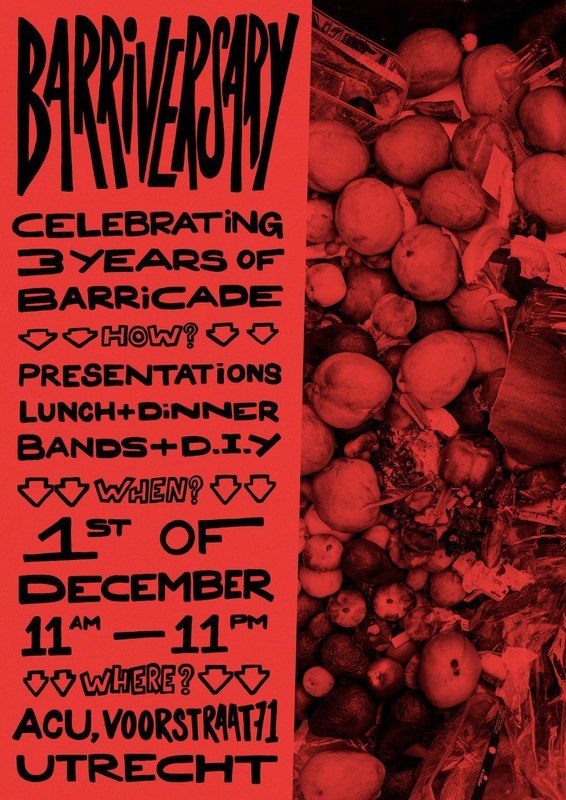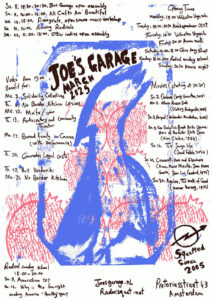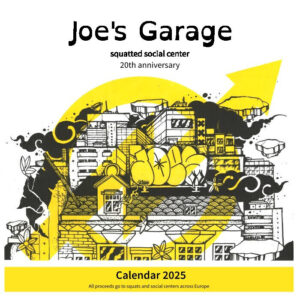 A promising event organized by The Barricade taking place at ACU, Voorstraat 71 in Utrecht on Sunday 1st December. The Barricade is a “volunteer-run collective inspired by raccoons and anarchism“, hosting a weekly sunday event at ACU. https://thebarricade.noblogs.org/
A promising event organized by The Barricade taking place at ACU, Voorstraat 71 in Utrecht on Sunday 1st December. The Barricade is a “volunteer-run collective inspired by raccoons and anarchism“, hosting a weekly sunday event at ACU. https://thebarricade.noblogs.org/
The Barricade will be celebrating 3 years anniversary, Striving for Autonomy! and has already announced a full day of events, from vegan brunch to music, exhibition, a book presentation “The Barricade ABC” and various workshops, discussions such as “Reflection Tables on People’s Kitchens and Political Struggle”, “DIY: A collective toolbox against the supermarkets”, “Social Centers as basis for Counter-power”.
Reflection Tables on People’s Kitchens and Political Struggle https://squ.at/r/7gxy
A big part of what we’ve been doing for the past years, is hosting the anti-food waste dinner on Sunday evening. For us, providing people with a meal made from trash for free or donation is a political statement to address the problem of food waste and the importance of collective cooking and eating. We are not the only ones doing this, there are a lot of VoKus around in the Netherlands who organise meals or events out of the same political principles. We would therefore like to host reflection tables in the afternoon during Barriversary, to share experiences and start a reflection about the importance of food and collective cooking/eating.
The topics for the three tables we’re going to host are these:
1. The politcs of food: How can we use our kitchens and the food we cook with to bring forth change?
2. Escaping the service dynamics: What to do when people see you as a service and not as a collective effort?
The reflection tables are open to anyone to join but they mainly adress people already active in VoKus.
If you are planning to join, send us an email at barricade [at] riseup [dot] net
Introduction texts to the reflection tables:
=============================================
1. Politics of food: How can we use our kitchens and the food we cook with to bring forth change?
We want to express a strong and firm critique at the current standardized and industrialized food production system, harmful for everybody’s health and even worse for the communities living in the territories where this food is produced. This terrible food quality is due to the usage of chemicals and techniques based exclusively on principles of cost minimization and quantity maximization. This is also a system that wastes more than one third of what is produced. Perfectly fine fruits and vegetables fill bins everywhere around the city everyday.
However, we deem necessary overcoming a simple critique of the food production system, especially in these years where the global capitalist paradigma redefines itself around apparently ecologist instances. In the new “green economy” food gains a fundamental role, and labels like “organic” or “local” or “anti-foodwaste” are nowadays seen as economically valuable even from those businesses and governments that in the past and even now greatly contribute to devastation of lands. And for this reason then, in the case of food-waste we have been seeing a lot of business models (ads in supermarkets, fancy anti-foodwaste restaurants, anti-foodwaste apps…) coming up trying to make money out of food-waste pretending to solve the problem.
Moreover, not even the so called “organic food” is immune to heavy contradictions and power dynamics enriching the few and usual suspects. The certification system is placing the organic production in the exactly same dynamics of the usual food industry; this critique, limited as it is to the healthiness of the product, is nothing more than the rhetoric of (presumed) “quality food” – that of course only very few “lucky” ones can afford, on the basis of the usual equation (low income : bad food = rich people : certified organic food) – if it does not come with a firm and fundamental refusal of any logics of exploitation, logics that all these discourses on green capitalism do of course never question.
We do think that any meaningful discourse on food should start from this: the industrial food system and its production and distribution are completely centered on the wildest exploitation: of land, of water, of animals and of human labour. Making it greener won’t change the dynamics.
In many VoKus this critique is manifested in different ways, even if partially. We ourselves dumpster-dive every week, getting fruits and veggies, still perfectly fine to eat, literally out of the trash bins. This allows us to expose foodwaste, one of the most visible contradictions of this food production system (and its supposed efficiency) and at the same time to serve a free dinner with what is considered to be waste. While, by reclaiming this waste, we firmly reject the large-scale retail trade and all the exploitation it directly or indirectly perpetuates, we do recognise that this is not building complete alternatives to this food production system.
Other VoKus do the same thing we do, others use local products from small-scale farmers, others are buying most of their food from the supermarkets.
It is also necessary to confront the contradiction arising between the support that the food bought in supermarkets gives to the ipercapitalistic economy, thus the excessive power of the large scale distribution imposing woldwide new forms of slavery (from fields in the Global South to the distribution centers of Jumbo or Albert Heijn) and the ideas and experiences circulating in the spaces where our kitchens are operating, and where, despite everything, we still do find ourselves buying, from time to time, from the supermarkets.
For these reasons, we deem necessary to reflect together on ways to collectively refuse the existing and build new possible alternatives starting also from food.
All this implies in our opinion questioning what it means politically to choose which products to use in the kitchen, that is, considering how doing grocery is a political act, how all these choices can have an impact when they are situated inside collective processes, in this case, to build a network of relations between producers and consumers/cooks at a local level, creating communities of solidarity based not only on economic relations but on sharing political goals, and making it possible, for real, to give everyone access to a decent meal.
We would like to discuss on this and other ideas and try to think together on ways in which we can start creating alternatives through food.
=============================================
2. Escaping the service dynamics: What to do when people see you as a service and not as a collective effort?
“All the restaurants that have had flowery write-ups in the newspaper, that serve only organic, wheatfree, vegan food, that cultivate a hip atmosphere with suggestive drawings, still have cooks, waiters and dishwashers who are stressed, depressed, bored and looking for something else.” (Abolish all Restaurants)
The modern city is full of restaurants and other places where food, one of the main aspects of social reproduction, gets commodified and therefore inserted into capitalist dynamics that are both, eploitative towards the workers, and exclusive towards who can get access to this food.
Our Vokus are attempts to get the meal and its production out of these dynamics and make space for their collectivisation. We see this as a step to gain back some autonomy on our lives. We want to run them without cooks, waitress, cleaners and guests, but with the partecipation of the people that all can differently contribute.
To achieve this, the involvement of everybody in the space is essential.
However, living in the society we live in, this involvement is not something that comes automatic, be that because of lack of time and energy, or because we forgot what collective self-management is and became unaccostumed to putting it into practice.
The feeling of being perceived as a service, a simple free meal, often pops up, delegitimizing the conflictual role we want to assume inside the city. While we don’t want to criminalize people that for one evening are coming for a free meal and nothing more, we deem it necesessary to reflect together and find practices to not lose this conflictuality and push forward an idea of collective self-management
The Social Center as basis for Counter-power https://squ.at/r/7hu6
Economic insecurity, over-individualisation, constant anxieties, fear. Everywhere you look, capitalist democracy is in trouble, very few people believe that politicians are really going to solve their problems, and still conditions worsen and worsen. In this context, the necessity of doing things differently arise, the necessity of creating a collective space where we can practice solidarity with each other, a space where we can try, autonomously, to gain back control over our lives and over what surrounds us.
This space is what a Social Center should be: a basis for Counter-power and solidarity in the city.
In our context, however, squats and social centers often happen to not be very connected with the neighborhood, and thus all the people living there, but are more spaces for the radical scene only, if not just spaces for concerts and parties of a certain subculture that tends to be commodified more and more.
We therefore feel the urge to start a discussion on this and to confront ourselves with examples of social centers more connected with a certain kind of popular struggle, situated in different contexts. For these reasons, we invited the Ex-OPG Je So’ Pazzo from Naples and the Kiezkommune from Berlin to come and talk about their experiences and reflect on these topics with us.
During this panel, beside seeing the examples of how striving for counter-power and practicing solidarity can look like, we are going to address various thematics.
What are the reasons that brought to a certain “subculturalisation” of social centers? In which ways do practices of solidarity and mutual aid differ from assistentialism? What are the conditions that can bring to gaining more or less autonomy from the state?



